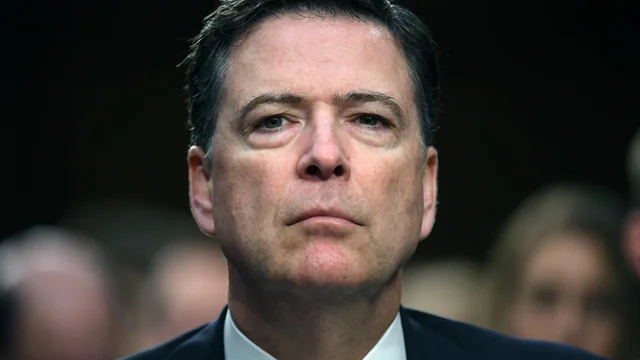The Arraignment of James Comey and the Shadow of Authoritarian Play
On October 8, 2025, former FBI Director James Comey stood in a federal courtroom in Alexandria, Virginia, pleading not guilty to charges of making false statements to Congress and obstructing a congressional proceeding—accusations revived from his 2020 testimony on the FBI’s Russia investigation. Career prosecutors in the U.S. Attorney’s office for the Eastern District of Virginia had previously determined there was insufficient evidence to secure a conviction against Comey. The indictment was ultimately signed by Lindsey Halligan, a former personal attorney to Trump, after she was installed as the acting U.S. Attorney. The trial date for Comey’s case has been set for January 5, 2026. Comey’s lawyers will first pursue motions to dismiss the charges, arguing they are politically motivated.
This case isn’t about justice; it’s a calculated act of retribution in President Donald Trump’s long-promised “retribution” campaign against perceived enemies. Comey, whom Trump fired in 2017 amid the Russia probe, has been a personal fixation—Trump publicly demanded his prosecution as early as 2020, labeling the investigation a “witch hunt” and vowing to hold accountable those who “weaponized” federal agencies against him. The charges, unsealed just weeks ago, accuse Comey of lying about authorizing an anonymous media briefing on the probe—a claim his legal team dismisses as baseless and politically motivated, potentially facing dismissal on grounds of selective prosecution. Comey joins a growing list of targets, including COVID-era officials like Dr. Anthony Fauci and even former Fed Chair Lisa Cook, in what critics call a systematic purge of Trump’s political adversaries.
The case’s path to court reveals a Justice Department under siege. Career prosecutors in the Eastern District of Virginia, known for its fast-paced docket and conservative leanings, balked at pursuing it—citing inadequate evidence, procedural flaws from COVID-era remote testimony glitches, and the risk of it being seen as vindictive. U.S. Attorney Erik Siebert resigned in September 2025, reportedly for refusing to indict Comey, triggering a leadership vacuum that Trump exploited by appointing Lindsey Halligan as interim U.S. Attorney. Halligan, a 36-year-old former Miss Colorado USA with zero prosecutorial experience, met Trump on the golf course and served as his personal defense lawyer during his first term, later rising to a White House aide role scrutinizing institutions like the Smithsonian for “woke” ideology. Her swift installation—bypassing Senate confirmation under a 120-day interim rule—ensured the case moved forward, underscoring Trump’s strategy of installing loyalists to bend the DOJ to his will.
This isn’t isolated—it’s a chilling escalation in Trump’s broader assault on dissent, designed to instill fear and silence opposition much like Adolf Hitler’s early moves in 1933. Fresh off his January 30 appointment as Chancellor, Hitler exploited the Reichstag Fire on February 27 to issue a decree suspending civil liberties and enabling warrantless arrests of political foes, primarily Communists like Ernst Thälmann and Social Democrats, under pretexts of “national security.” Over 4,000 were detained in weeks, many tortured at Dachau, to crush rivals and pave the way for the Enabling Act’s totalitarian grip. Today, Trump’s DOJ—under Attorney General Pam Bondi—mirrors this by reviving stale cases against critics, fostering a climate where former officials whisper about “self-censorship” to avoid crosshairs. The message is clear: Speak out, and face ruinous legal battles, echoing the Nazis’ use of “lawfare” to terrorize and divide.
At its core, this is Trump’s “plan” laid bare: dismantling the Justice Department as an independent bulwark against abuse, replacing it with a tool for personal vendettas. Since January 2025, he’s fired ethics officials, rescinded Biden-era appointee safeguards, and issued executive orders targeting law firms like Paul Weiss for “unethical conduct”—singling out Trump’s former investigator Mark Pomerantz and threatening security clearances for non-compliant attorneys. He’s ordered probes into “deep state” holdovers, halted anti-corruption enforcement, and pressured prosecutors to pursue baseless charges against foes like New York AG Letitia James—actions that demand ethical contortions from DOJ staff, eroding the rule of law. This follows the Dictator’s Playbook to a fault: Capture institutions like the DOJ through loyalist appointments (Halligan’s golf-course loyalty), exploit pretexts (old testimony as “lies”), and delegitimize opponents to spread fear—steps Hitler mastered in 1933 to end democracy within months. Trump’s version is slower, cloaked in legal niceties, but no less insidious: a DOJ twisted into a weapon risks not just Comey’s freedom, but the chilling of all dissent, hurtling us toward the authoritarian abyss of 1930s Germany.
We can’t afford complacency. As history warns, unchecked “retribution” becomes tyranny. Vote against the GOP’s enablers, support independent watchdogs like the ACLU, and demand accountability—before the playbook’s final chapter writes itself. Never again.


